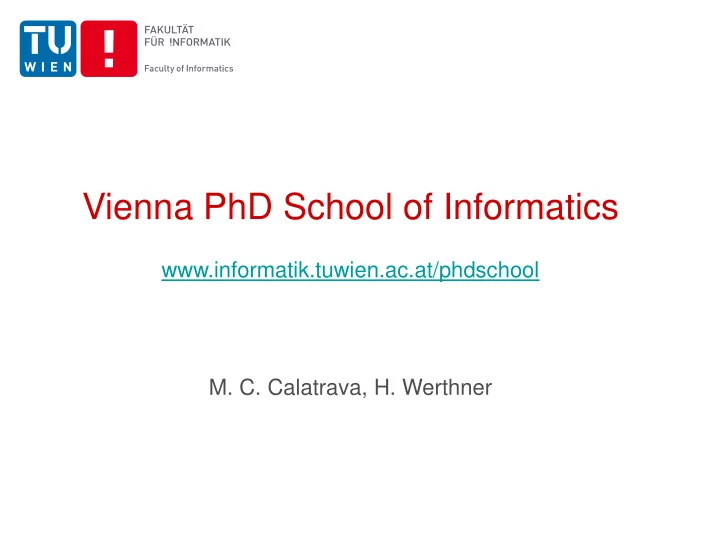

Vienna PhD School of Informatics www.informatik.tuwien.ac.at/phdschool M. C. Calatrava, H. Werthner
Outline Objectives and design Some results First summary
Objectives Structured full-time program with scientific focus Focus on knowledge creation “Broad” – Entire Faculty of Informatics, not only one single CS research topic – Provide broader disciplinary view on CS – Cover the different methodological views (mathematical / logic reasoning, engineering / design methodology, natural science / empirical approach) Increase quality (and quantity) of young scientist, they should – have scholarship (breadth) – contribute to the creation of knowledge (depth) – thus, gain the ability to solve complex scientific problems Reflect international developments Position the faculty as research institution (also in public discussion)
International Situation Europe (diverse landscape) – “European” Master -apprentice model as well structured models – Differences between and within countries and universities Different entrance levels (even with Bologna process) Curriculum (area and fundamental courses) Process with preparatory / dissertation phase, and exams Duration and payment / scholarships Admission processes – European University Association (EAU) “ Doctoral programs for the European knowledge society” questions classical model and emphasizes structural approaches United States – Structured curriculum and milestones process – PhD follows undergraduate / bachelor Asia – Follows mainly US American approach (not Japan)
Design Vienna PhD School … The curriculum covers computer science and business informatics It covers all research areas of the entire faculty Three years English full-time program with scholarship Area and fundamental courses Integration of visiting Profs Parallel to the traditional doctoral program and topic-specific doctoral colleges Higher number of ECTS (39 vs. 18 ETCS) Since 2009 … International admission process selects approx.15 students / year Students do not need a PhD topic or advisor Students are entitled a scholarship and travel budget Co-funded by City of Vienna
Curriculum Final Exam / PhD Defence 3 rd Year PhD Thesis 2 nd Year PhD Courses Qualifying Exam Area Courses Fundamental Courses Comprehensive 5 PhD courses 3 Master Exam 5 courses 1 st Year ourses Admission
Curriculum – 2 Courses Fundamental courses (15 credits, i.e., 5 courses): Philosophy of Science, Research Methods, Research & Career Planning, Innovation, PhD seminar Area courses (15 credits, 5 courses): covering research areas; one of these courses from another area. Research areas are: – Business informatics – Computational intelligence – Computer Engineering – Distributed / parallel systems – Media Informatics / Computer Graphics T wo courses per area by visiting scientists Master courses (9 – 12 ECTS) to raise / balance level Also “outside” courses (e.g., Summer schools or at other Universities)
Process Milestones / Exams Comprehensive exam: evaluation of knowledge (state-of-the-art) Qualifying exam (written and oral): PhD proposal (after 1. year) Final exam (two external and one internal reviewer) Organization Students integrated into research groups within first year “Assigned” to advisor (complex process)
First Results • 4. year of program • In total 43 students and 2 alumni Applications received 700 600 500 400 300 200 100 0 2009 2010 2011 2012
First Results – 2 Students’ nationalities per geographic area African Arabic Asian European North American South American
First Results – 3 Gender of current students 18 16 14 12 10 Male 8 Female 6 4 2 0 Cohort Cohort Cohort Cohort 2009 2010 2011 2012
First Results – 4 Attrition reasons per gender 8 7 6 5 4 Male 3 Female 2 1 0 Personal reasons Accepted other Low performance PhD
Evaluation Framework Multidimensional framework to be applied on a regular basis to analyze achievements and to benchmark performance Different angles Qualitative and quantitative approaches Students’ Perceptions Faculty “Formal” Perceptions Criteria Doctoral School Visiting Profs’ Network Perceptions Analysis
Summary What we achieved – First positive indications on “quality” of students (breadth and depth) and their results – Program established – Increasing quality of procedures (content related and organisational) – Many excellent visiting Profs (up to now 17) – PhD School “identity”, also with special activities – Initiated evaluation process – PhD school may act as template / guideline for doctoral education at faculty What we did not achieve Sustainable and external funding “Missing” 4 th (and further) years Curriculum may need more flexibility “Improvable” internal / external positioning
Thank you Vienna Phd School of Informatics http://www.informatik.tuwien.ac.at/phdschool
Recommend
More recommend